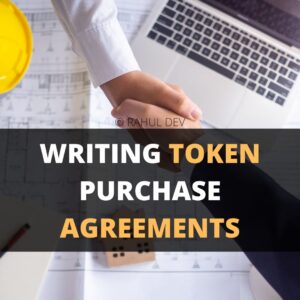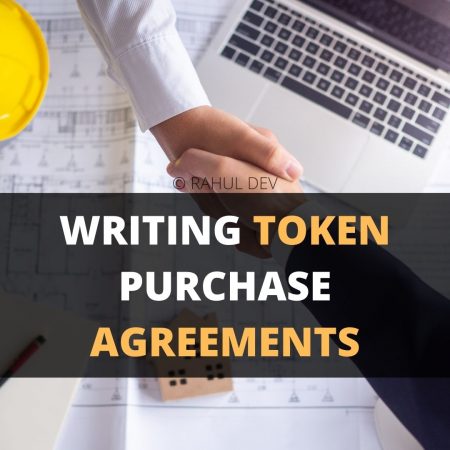Token Purchase Agreements
Explore the Process to Write Effective Token Purchase Agreements

Understand Practical Aspects
Understand how to protect the investor's interest

Explore the Process to Write Effective Token Purchase Agreements

Understand how to protect the investor's interest

Protect your innovations across multiple countries and create strong patent portfolio to boost business valuation
Local and global brand protection through international trademark registrations
Extensive research and business writing for technical whitepapers and B2B content products
Recently, while writing an effective token purchase agreement for a blockchain project, I realized that it is crucial to prepare a list of best practices and important points to be included while adding important clauses to protect investor’s interest during token sale event of a blockchain project. The main goal of writing token purchase agreement is to align with the specific characteristics of the project by considering the unique objectives, regulatory requirements, and functionalities of the token and project involved. For example, the initial considerations that I follow is to determine if the project features are centralized or decentralized, and if the token is utility-driven or investment-based, which eventually assist me in preparing custom legal frameworks to ensure the required compliance.
In centralized blockchain projects, where the project team retains control over token supply and demand, Token Purchase Agreements often take on a form similar to traditional software licensing agreements. The focus here should be on providing clear terms regarding the token’s utility, often as access keys or subscription-based services. Additionally, the Token Purchase Agreements should delineate the roles and responsibilities of the project team in managing the tokens. Other critical components include standard clauses that address payment terms, refund policies, and the obligations of users.
Similarly, for decentralized projects such as Decentralized Autonomous Organizations (DAOs) the token purchase agreements are written in a highly custom manner to reflect the community-driven nature of the project. In such projects, the governance rights associated with tokens are clearly outlined, thereby enabling the token holders to actively participate in decision-making processes. Moreover, the token distribution mechanisms are defined in a manner such that it aligns with the decentralized and community-focused aspects of the project.
This article covers following topics:
Example of Token Purchase Transactions
Structuring Token Purchase Agreements for Blockchain Projects

Recently, the Block reported the funding and token valuation of the Cobie Echo project, emphasizing the significance of Token Purchase Agreements in this context. The Token Purchase Agreements provide legal clarity regarding the terms of investment to the investors and the token issuing entity. This subsequently helps to minimize potential disputes by ensuring that all parties understand their rights and obligations. Furthermore, the Token Purchase Agreements play a vital role in protecting investors’ interests by outlining specific terms related to token valuation and funding. In the case of Cobie Echo, these agreements ensure that investors are informed about how their funds will be utilized and what they can expect in return. This transparency is essential for fostering trust between the project team and its investors.
As may be seen herein, the funding process for Cobie Echo also highlights the need for compliance with relevant regulations. During token sale and purchase transactions, a well-written token purchase agreement can help ensure that token sales are in compliance with the legal standards, which is vital for maintaining investor trust and avoiding regulatory issues. Additionally, given the volatility associated with token valuations, the token purchase agreements can include risk disclosures that inform investors about potential market fluctuations, aiding them in making informed decisions. In relation to Cobie Echo’s funding, the Token Purchase Agreements help in establishing a clear framework for how token valuations are determined. This transparency is essential for fostering investor confidence and ensuring fair market practices. Moreover, the importance of having mechanisms in place for resolving disputes is underscored within the context of Cobie Echo’s funding structure. Typically, the Token Purchase Agreements include clauses that outline how conflicts will be managed, providing reassurance to both parties involved. As Cobie Echo seeks further funding, the Token Purchase agreements can outline conditions for future investment rounds. This ensures that existing investors are protected while also attracting new capital. In summary, Token Purchase Agreements play a critical role in establishing a secure and transparent framework for projects like Cobie Echo, addressing legal, financial, and operational aspects essential for successful token sales.
The classification of tokens also influences the structure of the token purchase agreements. In case of utility tokens, which grant access to a specific product or service, the token issuing projects require agreements that emphasize the token’s utility within the project’s ecosystem. Specifically, the Token Purchase Agreements for utility tokens should carefully define how these tokens will function and must ensure that they comply with regulatory distinctions between utility and security tokens. The Token Purchase Agreements for security tokens representing ownership or investment interests usually require an additional compliance with the applicable securities laws. Accordingly, the Token Purchase Agreements for security tokens generally include detailed disclosures about the investment nature of the tokens, such as profit-sharing mechanisms and voting rights. Furthermore, such agreements also incorporate compliance measures, including, Know Your Customer (KYC) and Anti-Money Laundering (AML) protocols to meet the legal obligations as per applicable laws and regulations.
The structure of the token sale itself significantly impacts the content of a Token Purchase Agreement. For projects conducting Initial Coin Offerings (ICOs) of utility tokens, the Token Purchase Agreements usually include terms related to fundraising goals as well as timelines for token distribution post-sale. It is also essential to include provisions for refunds in cases where the fundraising targets are not met. Also, the projects that opt for Simple Agreements for Future Tokens (SAFTs) during pre-sales should include conditions outlining when and how future tokens will be issued, along with pricing structures and any discounts offered to early investors. Specifically, the SAFT agreements must also provide clear timelines for token release, which are tied to the achievement of key project milestones.
The goal of a thoroughly prepared Token Purchase Agreements is to establish the required legal framework for token sales in blockchain projects as per the applicable laws and regulations. Specifically, these agreements ensure compliance with legal requirements by protecting the interests of both buyers and sellers. Therefore, the Token Purchase Agreements reduce potential disputes and regulatory challenges by addressing applicable laws across jurisdictions. A blockchain project must comply with regulations in its incorporation location and major markets where buyers reside. This approach prevents compliance issues arising from jurisdictional discrepancies.

As a business coach and thought leader, I cannot emphasize enough the importance of innovation, new software patents, mobile apps, and patents for tech companies, startups, and entrepreneurs. The world is rapidly evolving, and staying ahead of the curve is vital for success. Embracing technological advancements such as blockchain and AI can unlock unprecedented opportunities, streamline operations, and propel businesses into the future with competitive valuation via intangible assets.
Click Here for AI Startup Valuation Guide.
For instance, blockchain technology can revolutionize supply chain management and secure data sharing wherein innovative business models are explained to the audience via technical whitepapers, while AI can automate and optimize decision-making processes. Mobile apps are no longer just a luxury; they have become essential tools for engaging customers and offering personalized experiences. Furthermore, securing digital innovation patents is crucial for protecting intellectual property, fostering innovation, and maintaining a competitive edge. By investing in these areas, businesses can position themselves as industry pioneers and pave the way for a prosperous future after thoroughly conducting the due diligence and reviewing the legal opinion letters, which in case of digital assets can assist in determining the tokens as utility assets or coins as utility tokens before listing the assets at an exchange.
Our team of advanced patent attorneys assists clients with patent searches, drafting patent applications, and patent (intellectual property) agreements, including licensing and non-disclosure agreements. Advocate Rahul Dev is a Patent Attorney & International Business Lawyer practicing Technology, Intellectual Property & Corporate Laws. He is reachable at rd (at) patentbusinesslawyer (dot) com & @rdpatentlawyer on Twitter.
Quoted in and contributed to 50+ national & international publications (Bloomberg, FirstPost, SwissInfo, Outlook Money, Yahoo News, Times of India, Economic Times, Business Standard, Quartz, Global Legal Post, International Bar Association, LawAsia, BioSpectrum Asia, Digital News Asia, e27, Leaders Speak, Entrepreneur India, VCCircle, AutoTech).
Regularly invited to speak at international & national platforms (conferences, TV channels, seminars, corporate trainings, government workshops) on technology, patents, business strategy, legal developments, leadership & management.
Working closely with patent attorneys along with international law firms with significant experience with lawyers in Asia Pacific providing services to clients in US and Europe. Flagship services include international patent and trademark filings, patent services in India and global patent consulting services.
Global Blockchain Lawyers (www.GlobalBlockchainLawyers.com) is a digital platform to discuss legal issues, latest technology and legal developments, and applicable laws in the dynamic field of Digital Currency, Blockchain, Bitcoin, Cryptocurrency and raising capital through the sale of tokens or coins (ICO or Initial Coin Offerings).
Blockchain ecosystem in India is evolving at a rapid pace and a proactive legal approach is required by blockchain lawyers in India to understand the complex nature of applicable laws and regulations.